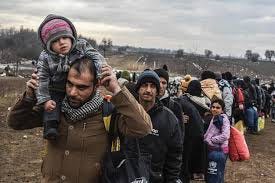The Left-Out Part of Immigration Reform

It’s very fashionable these days to speculate on immigration
reform. Our current president has his own views, most of which are keep ‘em
out, but current Democratic presidential candidates have jumped on the
bandwagon as well.
Senator Elizabeth Warren is the
latest, with I have a plan for that and she has some pretty good ideas.
But one thought I’ve had for decades now gets no mention at all and I wonder why.
If we were to issue work return visas to our Mexican
neighbors, it could move a long way toward lessening the pressure on our
southern border. How would such a visa function?
A visa is issued for seasonal
work on the basis of an employer willing to hire. That could be
extended by additional willing employers who need seasonal workers.
Think of agriculture, landscapers and job-related industries, such as contractors
with a project to build. When continuous employment ends, the worker returns to
his native country with the guarantee he can return to a willing employer.
Fear of return is gone and everyone benefits.

According to a National
Agricultural Workers Survey, seventy-five percent of our three million seasonal
crop workers were born in Mexico. Fifty-three percent of those were not
authorized to work in the United States. That means 1.6 million are here
illegally and they’re just the crop workers.
And they stay, because they’re
scared to death to leave and not be able to get back in.
Work return visas would mostly solve
Consider
the ‘off-season’ life of an undocumented worker. He’s away from his wife and
family, essentially without earnings and living a squalid life until the next
harvest. Unable to participate as a father, companion or loved one, he’s a
lonely wage-slave.
And
for what? For no discernable reason, other than our current disastrous immigration
laws.
Regardless of Mr.
Trump’s fear-mongering, most Americans have no fear at all, but he
certainly hasn’t helped the issue.
A 2016 Pew national poll
found that 76 percent believe undocumented immigrants are as honest and
hard-working as U.S. citizens, while 71 percent said they mostly fill jobs that
Americans aren't willing to do.
What Trump has done is shine a very bright light on
Congress’s total failure to come to grips with a better solution than tying
itself in knots over a useless and insulting wall between ourselves and Mexico.
For that, I thank him.
Consider that Mexico is the
third largest remittance receiving country in the world, with a total of over $25
billion received from both legal and undocumented immigrants in 2015. These
men and women are supporting families elsewhere.
Consider that, according to
their 2017 report, the Institute on Taxation & Economic Policy
estimates that undocumented workers paid a total of $11.7 billion in state
and local taxes in 2014, the most recent year of data.
Consider that they’re not
just picking grapes. Illegal immigrants are particularly concentrated in certain
subsets of major industries. In 2012, they represented 24% of workers in landscaping,
23% of those in private household employment, 20% in apparel manufacturing, 20%
in crop production, 19% in the dry cleaning and laundry industry and 19% working
in building maintenance.
Work return visas would further provide a useful filter for
those who someday hope to become American citizens. Application for permanent
residency and eventual citizenship by a head-of-household who had a proven
record of dependability and employment would certainly be a good bet.

One often hears that migrants are
often arriving for economic benefit rather than fear of reprisals or
death-threats in their home countries.
Perhaps you can tell me what’s
wrong with that?
In the late 1800s, both my grandfathers immigrated from
England and both my grandmothers from Germany. Why did they come?
They came for the promise of
America. That’s why Donald Trump’s grandfather emigrated from Germany.
Unless you are a native American
Indian, your forebears came from somewhere else as well. They may well
have been fleeing religious persecution, poverty or the long arm of the law,
but they came and they stayed.
For the promise of America.
They built the America in which we live, fought and
died in our wars, hammered out our laws, argued with and supported their
neighbors. There is no need to Make America Great Again, we are already
great as a nation and our immigrant population enabled that greatness.
Can we possibly foreclose that
opportunity to others and remain great?
That’s a question worth
pondering.
